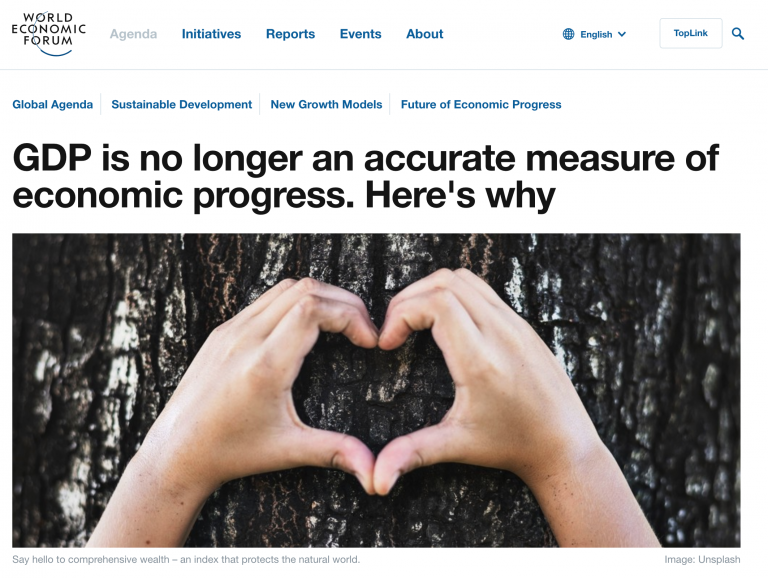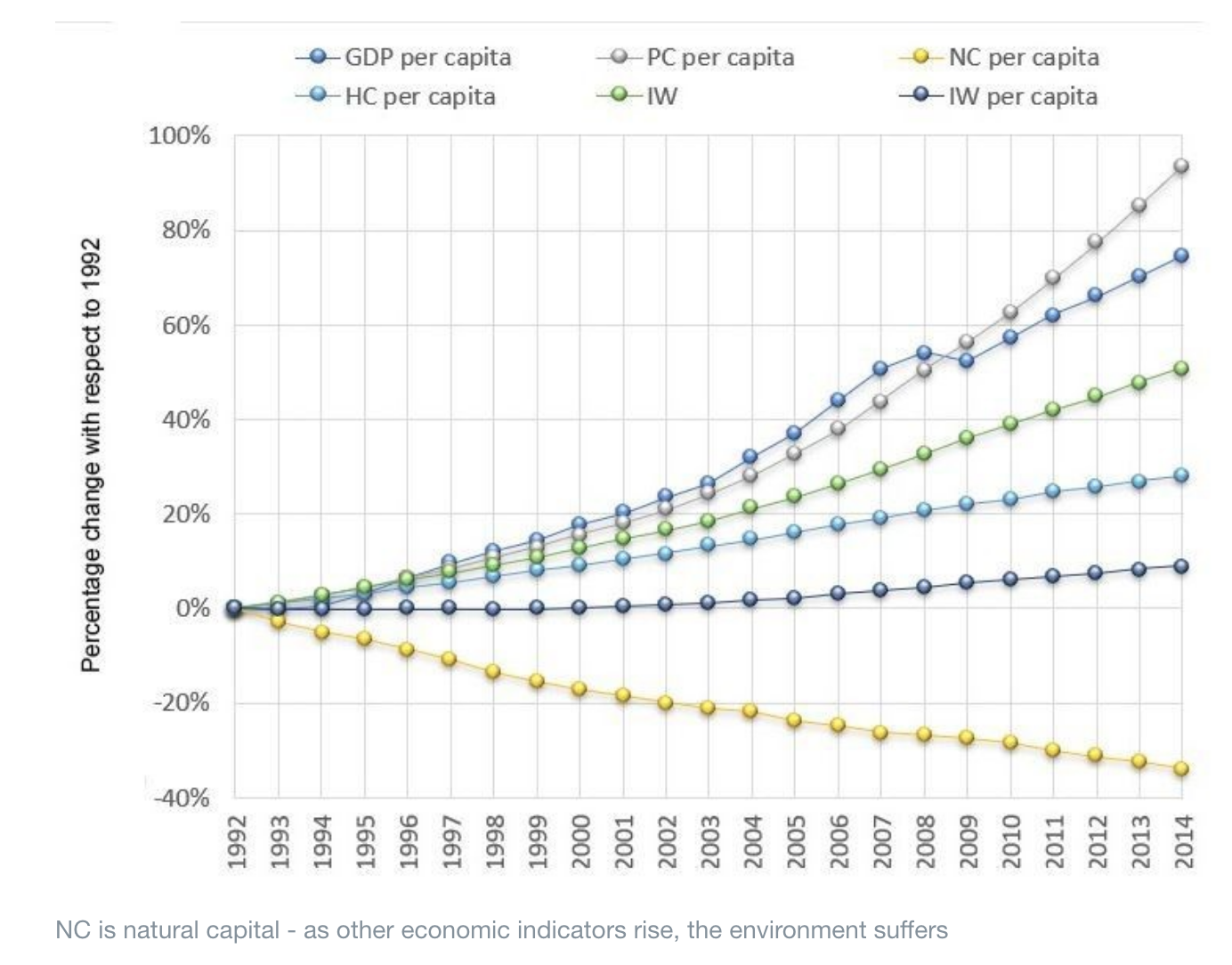Yves here. Unfortunately, the Davos man is still very much with us. And now they want us to think that they care. Gah.
By Richard Murphy, a chartered accountant and a political economist. He has been described by the Guardian newspaper as an “anti-poverty campaigner and tax expert”. He is Professor of Practice in International Political Economy at City University, London and Director of Tax Research UK. He is a non-executive director of Cambridge Econometrics. He is a member of the Progressive Economy Forum. Originally published at Tax Research UK
This has only just come to my attention, but that makes little difference to the points I make:

Yes, that’s the Davos crowd making this point. And they go on to say:
GDP provides measurements of output, income and expenditure quite well, and these are needed to understand and devise fiscal and monetary policies. But this measure flatly fails when it comes to wellbeing.
I guess that’s news to no-one but the Davos crowd.
They continue:
Hence growing international interest in a tool that still captures financial and produced capital, but also the skills in our workforce (human capital), the cohesion in our society (social capital) and the value of our environment (natural capital).
Work has advanced on some of these elements. The UN Environment Programme-led Inclusive Wealth Index shows the aggregation through accounting and shadow pricing of produced capital, natural capital and human capital for 140 countries. The global growth rate of wealth tracked by this index is much lower than growth in GDP. In fact, the 2018 data suggests natural capital declined for 140 countries for the period of 1992 to 2014.
This is the chart:

Again, I guess that’s news to no one, except the Davos crowd.
But what’s scary is the conclusion:
People deserve an accurate sense of how well their economies are performing, with a view to long-term sustainability. GDP has and always will have valuable short-term insights, but to respond to 21st-century pressures we need a modern economic measure.
At that point I wanted to scream. What we, apparently, need is a measure of how badly Davos mentality is screwing things up. We don’t need to heed the warnings. Or give up a growth obsession that fuels globalisation and is supported by the myth of profit maximisation driving well-being to which the whole of Davis subscribes. No, we just need a better measure of the damage that myth causes.
Bring on the Green New Deal, I say.
Will it be on the Davos agenda? I doubt it, somehow.


In about 20 years, they may start to “measure” the Green New Deal…
But they’ll do 20 more years of fiddling with interest rates and tax cuts first.
I suspect they will be measuring surface radiation from their underground bunkers, baffled as to why the poor people aren’t fixing the reactors for them.
Leadership based on money is an incredibly ignorant societal arrangement.
Fully elucidated about a quarter century ago in an October, 1995 article in the Atlantic – “If the GDP is Up, Why is America Down?” – by Clifford Cobb, Ted Halstead, and Jonathan Rowe.
Ah yes, the one pager. Because only really smart people can distill the world’s problems into a one page powerpoint.
Davos guys will be doubly happy to know that they are able to be increasingly wealthy while the rest are increasingly poor. Hey, their performance is improving with any new crisis!!
“Human capital” is a deceptive way of saying “buy low, sell high”. As an employee, you are bought for as little as possible, and sold for as much as possible, with Davos Man collecting that difference, making him filthy rich off the sweat of your brow. When you can no longer sweat for Davos Man, you are no longer human capital, and Davos Man would prefer you die quietly, so he can enjoy his jets and yachts without looking at the wreckage left behind.
“GDP provides measurements of output, income and expenditure quite well, and these are needed to understand and devise fiscal and monetary policies. But this measure flatly fails when it comes to well being.”
While I suspect birds instinctively understand the problem with fouling their nests, GDP promoters seem not as instinctively aware.
Much of the GDP industrial “output” pushes the world ever closer to the climate change tipping point, suggesting those promoting GDP growth don’t realize the sign on much of their favored metric is negative, not positive, when it comes to the well being of the earth and its inhabitants.
And concern about “well being” should not be limited to humankind.
As Michael Hudson has pointed out GDP includes all sorts of figures that rightly should be subtracted from economic output since they represent a cost, a drain on productivity as opposed to actual production. Fees charged by financiers, monopoly prices extracted by big pharma, ever-increasing rents, all these things make our economy more expensive, less competitive, and less productive, They make us collectively poorer, not richer. Fix how GDP is calculated and we’d see the truth behind the cheery numbers.
Perhaps they could add some trigger notifications regarding things such as: food riots likely, national strikes imminent, sudden purchases of large quantities of rope, etc. That would give them a few steps head start.
…pitchforks
Maybe a simple thing like reporting the Net Domestic Product.
I’ve been curious about the disappearance of the old Gross National Product, replaced by GDP… I thought the word National was just too impolitic to use in a globalized world and of course “national” implies a clearer view of sovereignty, etc. Probably had a tendency to nationalize all natural resources and other things no longer tolerable to globalization.
I am curious if there was an ulterior motive when US switched from GNP to GDP in 1991; does anyone know?
The United States used GNP as its primary measure of total economic activity until 1991, when it began to use GDP.[11] In making the switch, the Bureau of Economic Analysis (BEA) noted both that GDP provided an easier comparison of other measures of economic activity in the United States and that “virtually all other countries have already adopted GDP as their primary measure of production”.[12] Many economists have questioned how meaningful GNP or GDP is as a measure of a nation’s economic well-being, as it does not count most unpaid work and counts much economic activity that is unproductive or actually destructive.[13]
sorry, I jumped the gun on your comment… another question needs to be added to this inquiry: Why doesn’t GNP/GDP count socialized losses and externalized costs in an overall picture of economic well being? Davos doesn’t seem to be very interested in it either – Heaven forbid that economix turns out to be zero sum proving how much we have been mugged.
GDP can be misleading in areas that are rebuilding from a disaster. Sure everyone is buying and working on repairing the damage and GDP is up. I’m sure everyone would of been happier if everything had just stayed the same.
Human capital. This word as well as any other captures the dehumanizing nature of capitalism. Just a factor of production. We don’t have blood and bone and families. We have exploitable skills. Screw that. Leave not one stone upon another when you rise up and destroy the dystopian economy these swine have created.
So the most elite of the global elite have just now figured out that averages can be skewed by extreme outliers? What any undergrad student in statistics could tell you? Man, they’re really selling the need for global hierarchies.
The GINI coefficient isn’t perfect, but is still a reasonable measure of how wealth and income is distributed in society. It has clearly been a canary in the coal mine over the past 30 years.
I think the real truth is that the Davos crowd don’t believe what is staring them in the face, which is that rising inequality and socialized costs (wars, pollution, climate change, ecological destruction, financial crisis support, etc.) offset the benefits of increasing GDP. Reducing inequality and socialized costs would impact the percentage of wealth and income that the Davos crowd have, which they do not view as being in their best interest.
The single minded focus on GDP, corporate profits, and increasing wealth of the top 0.1% is leading to boom and bust cycles in numerous areas that are destabilizing societies. They are constantly creating potential Minsky moments with increasing potential to turn into French/Russian Revolution moments. Unfortunately, history has shown that the elite can march right into chaos without an inkling that it is coming.
The rise in doomsday type shelters for the wealthy indicates they know something is wrong, but they also seem to be thinking that the guys with guns they have hired to protect them will still be working for them when society collapses. History has shown that is not a safe bet.
A simple start would be to set a goal of rising GDP of 2%+ with a Gini coefficient similar to other periods when people thought there was a healthy economy and healthy (or at least improving) society – the 1950s and early 60s in the US comes to mind when the economy was steadily growing and great strides were being made in civil rights and environmental protection.
Yes, bring on the Green New Deal. And–if you’re reading these comments, Mr. Murphy–I commend you for your hand in its crafting over many years.